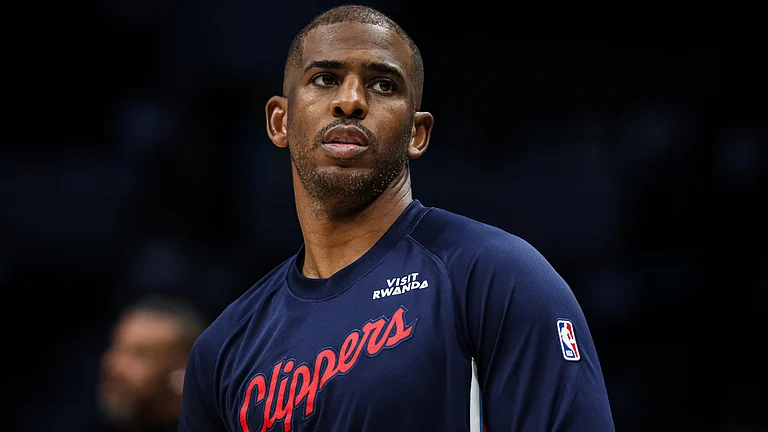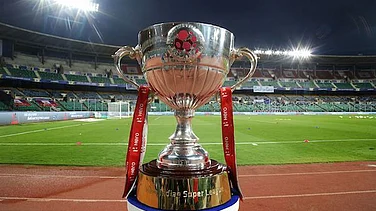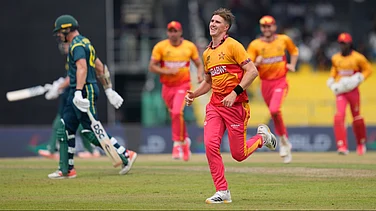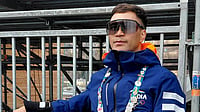India, with a record haul of 107 medals at the Hangzhou Asian Games, has written a glittering chapter in the country's sporting history, while also giving a strong reason to start dreaming about a best-ever Olympic performance next year in Paris. (Medal Tally | Sports News | Cricket World Cup)
The 660-strong contingent bagged 28 gold, 38 silver and 41 bronze at the continental showpiece, fetching 37 more medals than at the 2018 Jakarta Games.
Indian athletes even surpassed their expectations in some of the events such as shooting and archery, giving the country its best-ever hauls in these disciplines.
The fourth-place finish in Hangzhou, behind China, Japan and South Korea, is a testimony to the determination and the hard work the athletes -- many of them competing on the big stage for the first time -- put in when the world was being ravaged by the COVID-19 pandemic.
Ranking-wise too India's stature in the continent rose several notches. The fourth-place finish on the medals table is India's all-time third-best after the second and third positions in 1951 and 1962 respectively.
India had finished eighth in the 2018 Jakarta Asian Games.
The historic success here can bolster India's ambitions of hosting the Olympics. The government is reportedly mulling presenting the road map for the 2036 Olympics to the International Olympic Committee (IOC) when its session is held in Mumbai later this month.
India's unprecedented success in Hangzhou followed their best-ever medal haul at the 2020 Tokyo Olympics, and by that yardstick, the country's athletes can be expected to hit double-medal count in 2024 Paris.
Before the contingent left the country's shores, several officials in the Indian Olympic Association were skeptical about India touching the magical 100-medal mark, but medals started coming thick and fast from day one onwards.
Olympic champion Neeraj Chopra's global presence seems to have rubbed off on the entire contingent, and while he led the charge in athletics there is no denying that the javelin exponent was a motivation for athletes in other disciplines as well.
Of course, there were a few disappointments along the way -- the biggest being 65kg wrestler Bajrang Punia being humbled and humiliated on the mat -- but they were just a few sour notes in the success story scripted by the young Indian athletes.
Boxer Lovlina Borgohain, after her world championships success in Delhi was a sure-shot gold medal contender here, but finished second best, while weightlifter Mirabai Chanu finished fourth after suffering a thigh injury and shuttler PV Sindhu crashed out in the quarterfinals. But those were mere aberrations during the 15 days of breathtaking action.
Athletics and shooting contributed the maximum number of medals (29 and 22 respectively) making up nearly half of India's total and gold count. Shooting gave the most gold medals -- seven -- while athletics contributed six.
Archery gave nine medals, including five gold, in a huge improvement after just two silver in the 2018 edition. This was India's best show in archery in any edition of the Asian Games.
India's compound archers swept all the five gold medals on offer in a memorable show. Compound archers Jyothi Surekha Vennam and Ojas Pravin Deotale won three gold medals each, the most yellow metal among the Indians in any sport.
Avinash Sable (men's 3000m steeplechase), Annu Rani (women's javelin throw) and Parul Chaudhary (women's 5000m) won India's first gold medals in their respective events at the Games, while the men's 4x400m relay team won the yellow metal for the first time after 61 years.
The shooters also produced their best-ever show with seven gold, nine silver and six bronze.
Palak Gulia (10m air pistol) and Sift Kaur Samra (50m rifle 3-positions) won individual gold medals while the other five yellow metals came in team events.
Aishwary Pratap Singh Tomar became India's most successful shooter at the Games with four medals -- gold in men's 10m air rifle and 50m rifle 3P team events and silver and bronze in individual 50m rifle 3P and 10m air rifle.
Another shooter to win four medals was teenager Esha Singh who combined with Manu Bhaker and Rhythm Sangwan for gold in the 25m pistol and silver with Palak Gulia and Divya TS in the 10m air pistol. She also won individual silver medals in both 25m and 10m air pistol.
In terms of most medals, Aishwary and Esha topped the list among the Indians across sports.
The Indian men's hockey team dominated the tournament and clinched a deserving gold to qualify for the 2024 Olympics. India thrashed Japan 5-1 in the final. Before that, India also had the satisfaction of hammering arch-rivals Pakistan 10-2 in the pool stage, the biggest margin of victory by either team in the 180 matches they have played against each other.
The Indian women's hockey team, though, settled for a bronze after losing to hosts China 0-4 in the semifinals. Rohan Bopanna and Rutuja Bhosale also won the tennis mixed doubles gold.
India also swept the gold medals on offer in cricket and kabaddi, while squash also gave two yellow metals.
The men's cricket final between India and Afghanistan was abandoned due to rain and the Ruturaj Gaikwad-led team was declared gold winner based on higher seeding.
The Indian men's kabaddi team won the gold after a controversial final against Iran with players of both sides sitting on the mat in protest and play being held up for nearly one hour.
Star Indian men's doubles pair of Chirag Shetty and Satwiksairaj Rankireddy made history by winning the country's first-ever badminton gold.
In equestrian, the quartet of Sudipti Hajela, Divyakriti Singh, Vipul Hriday Chheda and Anush Agarwalla won the first-ever dressage gold.
India also won its first canoe medal in 29 years while the newly-added sport of e-sports did not yield any medal.
The Indian wrestlers also increased their medal count to six (1 silver, 5 bronze) though they went without a gold this time. They had won two gold and one bronze at the 2018 Asian Games.
The Hangzhou Asian Games also allowed many Indian athletes from humble backgrounds, like racewalker Ram Baboo and canoe exponent Salam Sunil Singh, to their moments under the sun.
Controversy hit athletics, that too in an event involving Neeraj -- the iconic Indian javelin thrower.
In a bizarre incident rarely seen in a major competition, the competition officials did not measure Chopra's first throw and also could not find the landing spot of his javelin.
Former long jumper and Athletics Federation of India senior vice-president Anju Bobby George accused the competition officials of trying to "cheat" the thrower.
Days before that incident, India's top 100m hurdler Jyothi Yarraji was first disqualified for a false start along with a Chinese competitor -- who was the culprit -- before the Indian was allowed to run and her bronze upgraded to silver.
In another unsavoury incident, 2018 Asian Games gold winner heptathlete Swapna Barman, after failing to win a medal, accused compatriot Nandini Agasara, who won the bronze, of being transgender. Barman later apologised to the country-mate.
Just before the Asian Games, three wushu players from Arunachal Pradesh -- Onilu Tega, Nyeman Wangsu and Mepung Lamgu -- were handed stapled visas by the Chinese government which were rejected by India.
The three players missed the Asian Games and Sports Minister Anurag Thakur cancelled his visit to China.


























